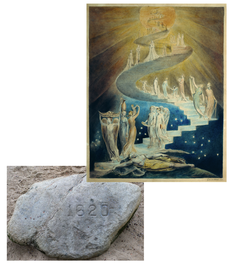| The fortuity that Thanksgiving often aligns with the Torah dream story of Jacob's Ladder isn't just a calendrical quirk. The Pilgrims of America's colonial experience understood themselves to be following, quite literally, in Jacob's footsteps as travelers on a God-blessed journey toward new spirituality and new opportunity in a new world. From their common narrative, there's much we moderns can learn about what Thanksgiving truly aspires to be – and how we are called to be and become in our own secular and spiritual lives. |
By Rabbi David Evan Markus
Vayeitzei 5784 (2023)
Note: These words come during the 2023 Israel-Hamas War, sparked by a terror attack on Israeli innocents that became the world's most lethal day for Jews since the Holocaust. Because current judicial ethics rules ban me from discussing the Israeli-Palestinian conflict,
I focus instead on some of the emotional and spiritual implications for us and Judaism.
Thanksgiving beckons us to count our blessings and honor ancestral journeys. Odds are that your forebears reached these shores only after courage powered them to start new lives somewhere new. Amidst fear, they set foundation stones for new dreams that fueled them up and down new ladders of social and economic mobility.
Such was the Pilgrims' experience after the Mayflower reached Massachusetts in 1620 (whether or not Plymouth Rock marks the landing spot). Even more, historical records show that the Pilgrims knew themselves to follow a ladder-dreaming Yaakov (Jacob) who, 3,500 years earlier in this week's Torah portion, set a stone to mark a new reality of dream and journey (Gen. 28:11-13):
Vayeitzei 5784 (2023)
Note: These words come during the 2023 Israel-Hamas War, sparked by a terror attack on Israeli innocents that became the world's most lethal day for Jews since the Holocaust. Because current judicial ethics rules ban me from discussing the Israeli-Palestinian conflict,
I focus instead on some of the emotional and spiritual implications for us and Judaism.
Thanksgiving beckons us to count our blessings and honor ancestral journeys. Odds are that your forebears reached these shores only after courage powered them to start new lives somewhere new. Amidst fear, they set foundation stones for new dreams that fueled them up and down new ladders of social and economic mobility.
Such was the Pilgrims' experience after the Mayflower reached Massachusetts in 1620 (whether or not Plymouth Rock marks the landing spot). Even more, historical records show that the Pilgrims knew themselves to follow a ladder-dreaming Yaakov (Jacob) who, 3,500 years earlier in this week's Torah portion, set a stone to mark a new reality of dream and journey (Gen. 28:11-13):
| וַיִּפְגַּ֨ע בַּמָּק֜וֹם וַיָּ֤לֶן שָׁם֙ כִּי־בָ֣א הַשֶּׁ֔מֶשׁ וַיִּקַּח֙ מֵאַבְנֵ֣י הַמָּק֔וֹם וַיָּ֖שֶׂם מְרַֽאֲשֹׁתָ֑יו וַיִּשְׁכַּ֖ב בַּמָּק֥וֹם הַהֽוּא׃ וַֽיַּחֲלֹ֗ם וְהִנֵּ֤ה סֻלָּם֙ מֻצָּ֣ב אַ֔רְצָה וְרֹאשׁ֖וֹ מַגִּ֣יעַ הַשָּׁמָ֑יְמָה וְהִנֵּה֙ מַלְאֲכֵ֣י אֱלֹהִ֔ים עֹלִ֥ים וְיֹרְדִ֖ים בּֽוֹ׃ וְהִנֵּ֨ה יהו''ה נִצָּ֣ב עָלָיו֮ וַיֹּאמַר֒ אֲנִ֣י יהֹו''ה אֱלֹהֵי֙ אַבְרָהָ֣ם אָבִ֔יךָ וֵאלֹהֵ֖י יִצְחָ֑ק הָאָ֗רֶץ אֲשֶׁ֤ר אַתָּה֙ שֹׁכֵ֣ב עָלֶ֔יהָ לְךָ֥ אֶתְּנֶ֖נָּה וּלְזַרְעֶֽךָ׃ | [Yaakov left home and] came to a place where he stopped for the night, for the sun had set. Taking one of the stones of that place, he put it under his head and lay down in that place. He dreamed and, behold, a ladder was stood on the ground, its top reaching toward the sky, and angels of God were rising and falling along it! Standing atop it was YHVH, saying, "I am YHVH, God of your father Avraham and God of Yitzhak. The Land on which you lay I will give to you and to your offspring." |
Yaakov experienced awe, then woke doubting his awe. He named the place Beth El, literally, "House of God" (Gen. 28:19). So the birth impulse of every Jewish house of worship began.

Note: Depending on who one is, potentially every rock in Israel's rock-strewn terrain marks a "house of God" – or a current or future battlefield, or both. The Land may pulse with ancestry's God, infidels' God and/or a transcendent God. The Land might be home or occupied, safe or scary. Much as the popular Thanksgiving story often ignores that Native Americans thrived on the Land long before the Pilgrims landed in 1620, so do modern land claims attempt to erase ancient narratives.
The Pilgrims' historical records make sense that they'd identify with Yaakov's story. Both left home, journeyed to a new place where they believe God brought them, and believed that God gave them the Land. They imagined the Land to be holy, a new gateway to heaven.
In this new Land, both would climb a new ladder of freedom and opportunity. The Pilgrims even made for their children a Jacob’s Ladder toy – one of the few toys that their Puritanism allowed – to honor a Biblical reference that undoubtedly resonated with their own narrative.
One more similarity: both Judaism and Pilgrim Puritanism would build a new world on these stones. In Jewish tradition, Yaakov's dream "place" was Mount Moriah of Akeidah (Binding of Isaac) fame, and his pillow stone became a foundation stone of the Temple in Jerusalem on that same site – God's "house" on earth. For the Puritans, in 1630 John Winthrop famously called Plymouth Rock the foundation stone of a “City Upon a Hill” that would shine as a sacred beacon of hope and light for all humanity.
Fast forward to our days. Today’s dreams and markers maybe are less heady than the days of Pilgrim’s Progress and Yaakov's Beth El. But whatever our beliefs, at a certain level rocks are just that – rocks. What made them special was experience attributed to the sacred. If so, then in theory any rock could be that kind of portal.
Put another way, anywhere we lay our heads or lay a stone marker can be Beth El – a House of God. Theologically, that possibility must be so, lest we limit God.
If so, then it's not too much to imagine that everywhere can be a landing place for dreams and ascents, no less than for Yaakov and the Pilgrims. It's not too much to imagine that our own cities can become beacons of hope and light as much as Winthrop’s “City Upon a Hill."
Thanksgiving celebrates and invites us to reignite these hopes – and also reminds us that intention and hope are necessary but alone insufficient. As families gather for Thanksgiving bounties, many unseen have nobody and nothing. Countless millions live amidst poverty, hunger, war, disease and hopelessness. Countless millions feel themselves to live not atop a rock of blessing but struggling or squashed under a rock of others' bounty and triumph.
There's a lot to do.
As long as freedom and prosperity are blessings only for some, the shared dream of Yaakov and the Pilgrims will remain unfulfilled. As long as want and fear persist on our watch, both our civic foundation and our spiritual foundation – the proverbial rock of Beth El – will remain shaky beneath our feet.
Only when we roll up our sleeves and make universal the blessings we claim on Thanksgiving can the true meaning of Plymouth Rock and Yaakov's Rock become fully real. Only then can we claim true awe and joy. Only then can every rock, every Beth El, every House of God, truly be uplifted as a “house … for all peoples” (Isaiah 56:7).
From my heart to yours, Happy Thanksgiving – and let's get to work.
In this new Land, both would climb a new ladder of freedom and opportunity. The Pilgrims even made for their children a Jacob’s Ladder toy – one of the few toys that their Puritanism allowed – to honor a Biblical reference that undoubtedly resonated with their own narrative.
One more similarity: both Judaism and Pilgrim Puritanism would build a new world on these stones. In Jewish tradition, Yaakov's dream "place" was Mount Moriah of Akeidah (Binding of Isaac) fame, and his pillow stone became a foundation stone of the Temple in Jerusalem on that same site – God's "house" on earth. For the Puritans, in 1630 John Winthrop famously called Plymouth Rock the foundation stone of a “City Upon a Hill” that would shine as a sacred beacon of hope and light for all humanity.
Fast forward to our days. Today’s dreams and markers maybe are less heady than the days of Pilgrim’s Progress and Yaakov's Beth El. But whatever our beliefs, at a certain level rocks are just that – rocks. What made them special was experience attributed to the sacred. If so, then in theory any rock could be that kind of portal.
Put another way, anywhere we lay our heads or lay a stone marker can be Beth El – a House of God. Theologically, that possibility must be so, lest we limit God.
If so, then it's not too much to imagine that everywhere can be a landing place for dreams and ascents, no less than for Yaakov and the Pilgrims. It's not too much to imagine that our own cities can become beacons of hope and light as much as Winthrop’s “City Upon a Hill."
Thanksgiving celebrates and invites us to reignite these hopes – and also reminds us that intention and hope are necessary but alone insufficient. As families gather for Thanksgiving bounties, many unseen have nobody and nothing. Countless millions live amidst poverty, hunger, war, disease and hopelessness. Countless millions feel themselves to live not atop a rock of blessing but struggling or squashed under a rock of others' bounty and triumph.
There's a lot to do.
As long as freedom and prosperity are blessings only for some, the shared dream of Yaakov and the Pilgrims will remain unfulfilled. As long as want and fear persist on our watch, both our civic foundation and our spiritual foundation – the proverbial rock of Beth El – will remain shaky beneath our feet.
Only when we roll up our sleeves and make universal the blessings we claim on Thanksgiving can the true meaning of Plymouth Rock and Yaakov's Rock become fully real. Only then can we claim true awe and joy. Only then can every rock, every Beth El, every House of God, truly be uplifted as a “house … for all peoples” (Isaiah 56:7).
From my heart to yours, Happy Thanksgiving – and let's get to work.


 RSS Feed
RSS Feed